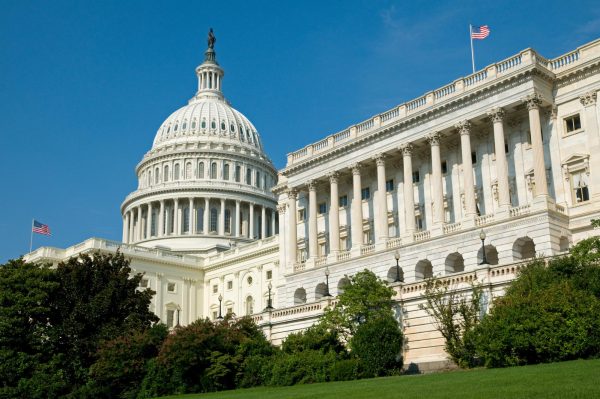
The top candidates of the Democratic and Republican parties — current President Joseph R. Biden Jr. and former President Donald J. Trump — are not in favorable positions despite leading in their respective primaries. Come election day, if no candidate reaches 270 electoral votes, the United States House of Representatives will elect the future president and the Senate will elect the vice president. This could result in a bizarre situation with Biden as president and Trump as vice president, or vice versa. This scenario could be beneficial for America, acting as an alternative to the current dominance of the two main political parties.
This could also allow for a third-party or independent candidate to be voted in, such as Robert F. Kennedy Jr. or Joseph Manchin III. Kennedy Jr. may provide necessary social reform to keep America out of war, whereas Manchin would be able to work across the aisle, which has not been done effectively since the Clinton administration. Kennedy Jr. has promised a path to peace in foreign policy, including a ceasefire in the Russia-Ukraine war and a cut in the U.S. military budget to provide more funding for basic human needs such as food, transportation and housing.
Historically, the U.S. House of Representatives elected the president in the elections of 1800 and 1824. The 12th Amendment to the United States Constitution states that if no electoral majority is won, the three candidates who receive the most electoral votes will be considered in the House vote. All 435 representatives have one vote each and must choose from those three candidates; they could vote for any of the three regardless of who won the popular vote or the Electoral College in the initial election. In the 1824 election, Andrew Jackson won the popular vote but did not attain enough electoral votes, so John Quincy Adams was elected the president by the U.S. House of Representatives.
According to American approval ratings from FiveThirtyEight, both President Biden and former President Trump are below average. Biden and Trump’s first terms show lower favorability than former Presidents Barack Obama, George W. Bush and Bill Clinton’s first terms.
Recently, several candidates outside of the traditional Democratic and Republican Parties also announced their 2024 presidential bids. The stronger the alternative candidates that are running, the higher the likelihood that electoral votes can be stolen, sending the election to the U.S. House of Representatives.
Kennedy Jr. is currently polling at 22% among registered voters in a recent Quinnipiac University poll. No third-party candidate has polled this high since Ross Perot, whose Reform Party managed to capture 19% of the popular vote in 1992. Perot failed to capture any electoral votes but received 19.7 million popular votes, creating the myth that Perot stole more votes from former President Bush to give Clinton the landslide victory.
Due to his family’s storied legacy in the U.S., Kennedy Jr. is the most recognizable third-party candidate. An environmental lawyer and now-independent presidential candidate, Kennedy Jr. appeals to many conservative, libertarian and left-wing voters. He is most notable for his skepticism of general government overreach and vaccine mandates, environmental regulations on corporations and his opposition of U.S. involvement in foreign conflicts. Kennedy Jr. believes having strong environmental regulations on the largest polluters will also cause economic prosperity.
The Kennedy family has a strong legacy in the northeast sector of the U.S. If you look at the states with the highest percentage of independent voters, many are “blue states like Massachusetts, Rhode Island, New Jersey and Connecticut.” If Kennedy Jr. can win at least one of these states’ electoral votes, the election will be sent to the U.S. House if the other 48 votes are split evenly.
West Virginia Senator Joseph Manchin III recently stated that he would continue exploring whether there was an appetite in the country for a third-party bid for presidency. Manchin may be the most centrist senator in Congress and could further split moderate voters along with Kennedy Jr. Manchin may be a good candidate for the newly-formed No Labels political group, as its primary focus is bipartisanship.
Americans have gotten tired of partisanship and have not had a middle-of-the-road president in many years. According to a recent study conducted by the Pew Research Center, U.S. adult responders were “Asked to describe in their own words the biggest problem with the political system, [and] 22% of Americans volunteer[ed] partisan polarization or lack of partisan cooperation.” Political polarization continues to grow, which makes accomplishing useful policy more difficult. A centrist candidate could capitalize on the possibility of a 2024 rematch election, which no one actually wants to happen.
In addition to wanting a grassroots center campaign, No Labels has also raised millions of dollars from donors over the last few years. Recently, No Labels called Manchin a “‘great leader … a tireless voice for America’s commonsense majority and a longtime ally of the No Labels movement.’” Like Kennedy Jr., Manchin would need to win the electoral vote in one or two states to prevent Biden or Trump from reaching 270 electoral votes.
Jill Stein will likely receive the Green Party’s nomination in the 2024 election. Stein is an environmentalist and practicing physician in Massachusetts who previously ran in the last two presidential elections. Stein received 1.4 million votes — about 1% of the popular vote — but no electoral votes in the 2016 election. Even if Stein fails to win any electoral votes, she may steal votes from the two main parties, which could assist Kennedy Jr. or Manchin in capturing one or two crucial states.
Philosopher and former Harvard Professor Cornel West has also joined the 2024 race as an independent candidate. A recent poll has West ranked at a high of 8% in the 2024 election polls among independent voters. West has been critical of both the Democratic and Republican Parties and is not concerned with whom he takes votes from — indicating he is in this race until the end. West is best known as a social justice advocate, “one the country’s most prominent Black scholars and activists, [and] ‘the architect of a post-civil rights philosophy of black liberation.’” West’s reputation in academia provides an alternative to the lifelong politicians in the race. Americans are currently disenchanted with traditional politicians, and an independent and intellectual thinker may be able to solve structural problems throughout America that the mainstream parties are helping maintain.
If Kennedy Jr., Manchin, Stein or West win electoral votes from only one state as small as Rhode Island, the 2024 election could be sent to the U.S. House of Representatives. The key is for Biden and Trump to split all the other states evenly — a concept not as unlikely as Americans may think. Most recent polling data shows Biden and Trump separated by a mere 3% margin over the last few months. Also, additional competitors may announce presidential candidacies outside of the two mainstream political parties. The more candidates in the race, the greater the chance that electoral votes can be diverted from the two major parties, sending the election to the U.S. House.














Ethan Eskenazi • Nov 30, 2023 at 5:21 pm
From the article: “If no electoral majority is won, the three candidates who receive the most electoral votes will be considered in the House vote. All 435 representatives have one vote each and must choose from those three candidates.”
This is incorrect. First of all, it’s very unlikely that this would ever need to happen. But if it does happen, then each representative does not get one vote. Instead, each state delegation has one vote. This means that a candidate needs to win 26 state delegations of representatives.
So for example, Virginia has 11 members of the House. Those 11 members will vote among themselves for who should be President, and whoever wins that mini-vote will then get Virginia’s one vote for President. If it’s a tie within the state delegation, then that state gets no vote. Whichever candidate gets at least 26 state delegation votes wins the election. This is known as a contingent election.
Concurrently, the Senate does this for the Vice President (but the Senators can vote individually, not by states).
Of course, it’s possible that the House vote for President could be tied 25-25, or 24-24, or another situation in which no candidate gets to 26 states. In that case, the Speaker of the House will become Acting President, until the House can finally choose someone. I really hope that this never happens, because it will be a huge mess.
Joyce Williams • Nov 29, 2023 at 11:26 am
There’s a mistake here. Each House member would NOT get a vote. Instead, each state representation gets one vote. California: one vote. Rhode Island: one vote. Here’s the relevant part of the 12th amendment: “in choosing the President, the votes shall be taken by states, the representation from each state having one vote.”